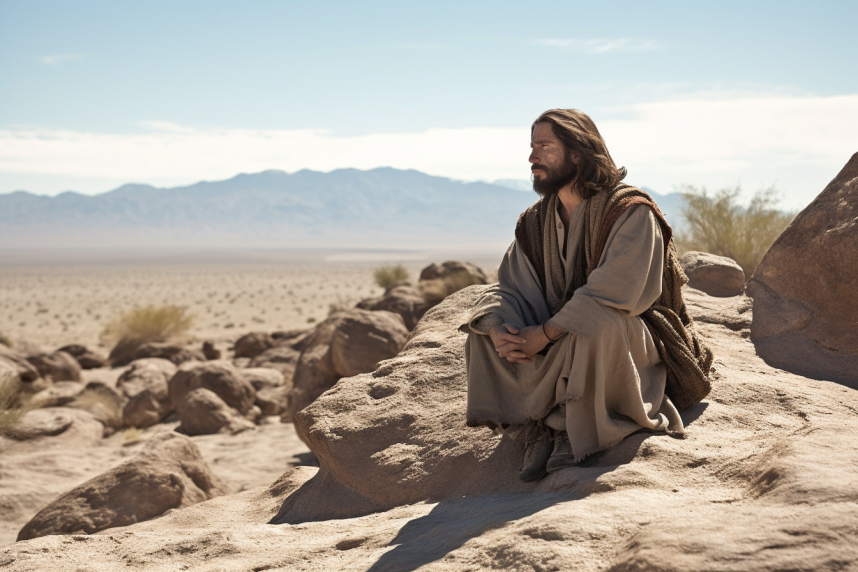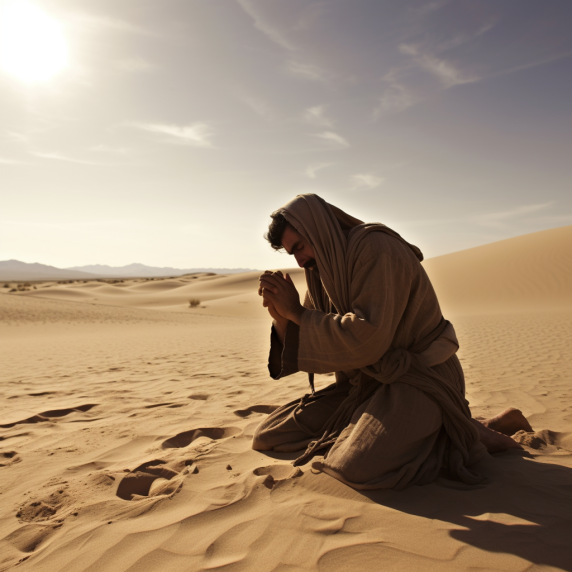Why Did Jesus Go Into The Desert For 40 Days: Discovering the Power of Fasting and Prayer
Jesus’ journey into the desert for 40 days is a significant event in the Christian faith. It is often associated with sacrifice, spiritual growth, and triumph over adversity.
The story of Jesus going into the desert before beginning His public ministry is mentioned in the gospels of Matthew, Mark, and Luke. But why did Jesus go into the desert for 40 days? The answer can be found in His purpose for the journey.
Jesus went into the desert for 40 days to fast and pray in preparation for His public ministry. He faced numerous temptations from the devil during this period but emerged victoriously.
The story of Jesus’ journey into the desert highlights the importance of spiritual discipline, perseverance, and the power of prayer.
As Christians, we can apply many valuable lessons from this story to our lives. Let’s explore the significance of Jesus’ journey into the desert and the lessons we can learn from it.

The Purpose of Jesus’ Journey
Jesus went into the desert for 40 days for various reasons. The primary reason was to fast and pray in preparation for His public ministry. By spending 40 days in the wilderness, He was able to draw closer to God and receive clarity on His mission.
In the Bible, fasting is seen as a form of self-denial and sacrifice that can lead to spiritual growth. It is also used as a way to express humility and dependence on God. Through fasting, Jesus strengthened His resolve and showed that He was fully committed to carrying out His mission.
Another reason Jesus went into the desert was to be tempted by the devil. This may seem counterintuitive, but it was a crucial part of His journey.
By facing temptation and emerging victorious, Jesus demonstrated that He was fully equipped to carry out His mission. His experiences in the desert also demonstrated His human nature, and his ability to relate to human struggles.
The Significance of The Number 40
The number 40 has significant symbolic meaning in the Bible. It represents a period of testing, trial, and growth before a significant event.
In the Old Testament, Moses spent 40 days on Mount Sinai, when he received the Ten Commandments.
The Israelites spent 40 years in the wilderness before they entered the Promised Land. In the New Testament, Jesus spent 40 days in the wilderness before beginning His public ministry.
Here’s a table that shows some other instances of the significance of 40 in the Bible:
| Event | Description |
|---|---|
| Rain Fell for 40 Days and Nights | In the story of Noah’s Ark, it rained for 40 days and nights. |
| Goliath Came Forward for 40 days | Goliath challenged the Israelites to send out a champion for 40 days. |
| Saul Reigned for 40 Years | King Saul, the first king of Israel, reigned for 40 years. |
| Elijah Traveled for 40 Days | Elijah traveled for 40 days and nights to the mountain of God. |
| Ezekiel Lay on his Side for 40 days | Ezekiel lay on his side for 390 days, but he only ate bread and water for 40 days |

As we can see from this table, there are many instances in the Bible where the number 40 is used to signify a period of spiritual growth, testing, and preparation before a significant event.
This reinforces the idea that Jesus’ journey into the desert for 40 days was an important part of His spiritual journey and preparation for His ministry.
The Role of Fasting
Fasting is an integral part of the Christian faith and is mentioned frequently in the Bible. It is a way to express devotion to God by abstaining from food or certain activities for a period of time.
Jesus fasted for 40 days in the wilderness as a way to prepare for His public ministry.
Here are some of the reasons why fasting is important in the Christian faith:
- Fasting helps us to draw closer to God and seek His will.
- It is a way to express humility and dependence on God.
- Fasting can help us to break unhealthy habits and overcome addiction.
- It is a way to develop self-discipline and cultivate a stronger spiritual life.
By fasting for 40 days, Jesus demonstrated His complete reliance on God and His willingness to submit to His divine will. His experience in the wilderness was a testament to the power of fasting and prayer.
The Power of Prayer

Prayer is another integral part of the Christian faith. It is a way to communicate with God and seek His guidance and support. Jesus spent much of His time in the wilderness praying and seeking God’s will for His ministry. Here are some of the ways in which prayer is important:
- Prayer helps us to draw closer to God and deepen our relationship with Him.
- It is a way to seek forgiveness and ask for help in times of need.
- Prayer can help us to develop a sense of peace and calm in the midst of difficult circumstances.
- It is a powerful tool for spiritual growth and transformation.
Jesus’ experience in the wilderness demonstrates the power of prayer and its ability to sustain us through difficult times.
By devoting Himself to prayer, Jesus was able to draw strength from God and emerge victorious over the temptations of the devil.
Temptations Faced By Jesus
During His 40-day journey in the wilderness, Jesus faced three specific temptations from the devil. These temptations were designed to test Jesus’ resolve and commitment to His mission.
Here are the three temptations that Jesus faced, and their significance:
Turning stones into bread
The first temptation that Jesus faced was to turn stones into bread. This was an attempt to get Jesus to use His divine power for His own personal gain.
However, Jesus replied,
“Man shall not live by bread alone, but by every word that proceeds out of the mouth of God.” (Matthew 4:4)
This temptation highlights the importance of relying on God’s word and trusting in His provision. It also demonstrates the danger of pursuing material wealth at the expense of spiritual growth.
Jumping from the pinnacle of the temple
The devil then took Jesus to the pinnacle of the temple and tempted Him to jump off. He said, “If you are the Son of God, throw yourself down. For it is written:
‘He will command his angels concerning you, and they will lift you up in their hands, so that you will not strike your foot against a stone.'” (Matthew 4:6)
This temptation represents the desire for power and recognition. The devil was trying to get Jesus to prove His divinity in a public display of power. However, Jesus refused to test God in this way, responding, “Again, it is written: ‘Do not put the Lord your God to the test.'” (Matthew 4:7)
This temptation reminds us of the importance of humility and not seeking to advance ourselves at the expense of others. It also demonstrates the danger of using religion as a means to gain personal power.

Worshiping the devil
The final temptation that Jesus faced was the most insidious. The devil offered to give Jesus all the kingdoms of the world if He would worship him.
However, Jesus replied,
“Get behind me, Satan! For it is written: ‘You shall worship the Lord your God, and him only shall you serve.'” (Matthew 4:10)
This temptation represents the lure of worldly power and the danger of putting our own desires above God. Jesus demonstrated the importance of fully committing ourselves to God and resisting the temptation to worship false idols.
Conclusion
Jesus’ journey into the desert for 40 days was an important part of His spiritual journey and preparation for His public ministry. It highlights the importance of spiritual discipline, perseverance, and the power of prayer.
We can learn much from Jesus’ experience in the wilderness and apply these lessons to our own lives.
By fasting and praying for 40 days, Jesus demonstrated His complete reliance on God and His willingness to submit to His divine will. His experience in the wilderness was a testament to the power of fasting and prayer.
The temptations that Jesus faced in the wilderness remind us of the struggles that we all face in our own spiritual journeys. However, by following Jesus’ example, we can learn to resist temptation, rely on God’s Word, and fully commit ourselves to His will.
In conclusion, the story of Why Did Jesus Go Into The Desert For 40 Days? is a powerful reminder of the importance of spiritual discipline and the power of prayer.
May we all draw inspiration from Jesus’ example and strive to cultivate a deeper relationship with Him through fasting, prayer, and devotion.

Sangtea Hmar is a passionate leader of the Youth Christian Fellowship at the Electric Vengthlang Presbyterian Church in Aizawl, Mizoram, India. He is the owner of Christiantone.com and is committed to spreading the word of God. He loves to mentor youth and help them grow in their faith.






